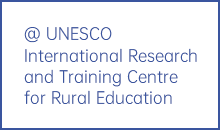In 2021, under the UNESCO's "Futures of Education" global initiative, the UNESCO International Rural Education Research and Training Center (the "UNESCO INRULED") launched a series of dialogues on the "Futures of Education and Rural Revitalisation Education", aiming to call on experts from all over the world to discuss rural education adaptation, and the measures and mechanisms for future-oriented education.
"Gender Equality in Rural Education" is the second session of the dialogue series.When we envision the future of education and advocate a new social contract for education, how should the gender perspective be placed? This is the theme of the second session in the "Futures of Education and Rural Revitalisation Education" dialogue series by UNESCO INRULED. Gender equality is a key factor in achieving the UN's 2030 Sustainable Development Goals (SDGs). It is one of UNESCO's global priorities and is vital to the future of sustainable development. As a member of UNESCO, UNESCO INRULED focuses on rural education and is committed to eliminating discrimination, marginalisation and exclusion, ensuring gender equality and the rights of all people. Therefore, UNESCO INRULED invited experts to discuss the topic of "Gender Equality in Rural Education". The host of this dialogue is Professor Zhang Lili from the Department of Education of Beijing Normal University. She is the Chief Expert in "Gender Equality and Women Leadership" of the UNESCO INRULED. The participating guests are Professor Han Jialing (Visiting Professor of the Institute of Economic and Social Research of Jinan University,Researcher at the Beijing Academy of Social Sciences), Ms. Li Hongyan (National Programme Officer of the Education Section in UNESCO Beijing Office), and Dr. Guo Xin (Lower and Middle School Divison Head at Whittle School, Shenzhen ). The dialogue of these four experts was around three topics.
"Gender Equality" and "Gender Equity" in Education: Significance and Challenges
“Gender equality” and “gender equity” sound like synonyms, but they bear different meanings. Ms. Li Hongyan introduced that when discussing gender equality, we are pointing to "a state of affairs" and "the results in terms of inputs, outputs or even outcomes". While gender equity is a process emphasising how to meet the demands of different individuals to obtain a corresponding degree of development. Therefore, gender equity is a process and the strategy to achieve the result of gender equality.
Gender equality has a crucial role in the 2030 Agenda for Sustainable Development. SDG4 is to "Ensure inclusive and equitable quality education and promote lifelong learning opportunities for all". For this goal, gender equality, as a specific goal, is important in building an inclusive learning environment. UNESCO has also formulated the Strategy for Gender Equality in and through Education (2019-2025). The strategic vision is to achieve gender equality in global education and to achieve gender equality through education. To achieve this vision, UNESCO has set two strategic objectives and three thematic priorities.
Promoting gender equality in education includes three aspects.
First, gender equality in education usually refers to equality of access to education. Both girls and boys can receive education on an equal basis.
Second, gender equality in education needs to reflect gender equality in education content, teaching process, teaching content, environment, and teaching practice. Girls and boys are equally integrated and participate in the learning process equally.
Third, by achieving gender equality through education, girls and boys obtain equal achievements and opportunities through education, enjoy life, and realise their potentials.
However, gender equality in global education still faces serious challenges. According to UNESCO's 2020 Global Education Monitoring Report, although the number of girls enrolled in primary and secondary schools has reached 180 million globally, and the female enrolment has risen three times at the tertiary level, the discrepancy and inequality still exist. Of all primary-school-age children who are still not enrolled in school, three-quarters are girls; two-thirds of the illiterate are women worldwide. In addition, female education took a hit, owing to the COVID-19. Coupled with the impacts of multiple factors such as domestic violence, early marriage and pregnancy, women's educational opportunities and outcomes are greatly restricted.
Since the 1980s, China has continuously adjusted the policies and gained experience in coping with the challenges of poor students dropping out of school, the high dropout rate of girls, and the lack of qualified teachers. China has made significant progress in protecting the right to education of girls and women. However, Professor Han Jialing pointed out that many problems under the nowadays social environment context, such as urbanisation, industrialisation, declining birth rate, and large-scale migration of rural population, have brought new challenges and problems to the promotion of gender equality and girls' education. The ongoing issues of disadvantaged groups in the education system, such as left-behind children, migrant children and boarding school children, call for continuous attention and discussion. Social development could reduce the number of these disadvantaged groups, but the issue behind cannot be eliminated. Among all these problems, the mental health of left-behind children, gender-based violence and safety guarantees are particularly worthy of in-depth discussion.
Gender equality and leadership: the situation of female teachers
As one of the essential roles in education, teachers not only undertake the responsibility of knowledge delivery but are also a symbol of education culture and social norms, playing a considerable part in promoting gender equality. However, teachers' development faces many difficulties worldwide, not only in China.
Professor Han Jialing said that the conditions confronted by rural teachers are particularly harsh. In addition to limited living conditions, they also have to care for the boarding students. Most female teachers must take burdens of parenting and their own family, leading to great troubles to their work and life. There are invisible obstacles for female teachers' career promotion.
Ms. Li Hongyan specified that more than 65% of rural primary school teachers worldwide are female, and the number remains around more than 50% on the secondary school level. But at the tertiary level, the proportion of female teachers is less than 50%. The inaccessibility of leadership positions in the education system for females directly manifests the lack of female role models. It is also one of the challenges in female leadership cultivation. To ensure that girls and boys have equal opportunities and obtain better education through schools, it is necessary to ensure equal support for teachers. The training and support for rural students, especially female students, can only be guaranteed when teachers' psychological, social, and emotional development is sustainable.
Regarding the dilemma of fostering female leadership and its reasons, Dr. Guo Xin took the Southwest Basic Education Project (SBEP) as an example. From the perspective of the stereotypes faced by women in family and work, she analysed the bottlenecks of female leadership in the public field, support system, and mental pressure. When discussing gender equality and female leadership cultivation, we should transcend the dispersion between individuals, family and work, so that women can see themselves as individuals interconnected with each other and the society and realise that "I have leadership." Only when some energy and initiative are released from women and opportunities are provided, can women develop rapidly. At the same time, if we can look beyond numbers and take a deeper look at social causes, that is where our hope lies in changing leaders in the future.
Reimagining our futures together: A new social contract for education
UNESCO released a new report Reimagining Our Futures Together: A New Social Contract for Educationthis year, proposing the concept of the social contract. When it comes to family education and school education, Dr. Guo Xin presented the concept of education as a social contract beyond family, school and education itself, emphasising the integrity of society. This means that when addressing gender equality, we should not only refer to the responsibilities of individual groups such as male or female, parents or schools but also promote changes in society's attitudes and actions. Only when everyone works together, pursues common goals, and takes effort together can we truly learn and develop.
Ms. Li Hongyan believes that the new report embodies the universal value of care and emphasises the idea of reciprocity and solidarity based on human rights protection. For everyone, education is an indispensable human right. This right should also be based on the principles of non-discrimination, social justice, respect for life, respect for equal values, respect for human dignity and cultural diversity. As for achieving fairer quality education through establishing a new social contract, there are five key areas, including pedagogy, teacher development, school protection and reform, and shaping the family and the (out-of-school) environment. What education will look like in 2050 depends on how we negotiate the establishment of this social contract and promote the participation of various sectors.
Professor Zhang Lili reviewed the latest Outline of Women's Development in China (2021-2030)and the Outline on the Development of Chinese Children (2021-2030)in China. Both outlines emphasise that schools and society should promote gender equality education. These are essential guidelines for China's future development, and they are in line with UNESCO's new commitment to education for girls and women. In the past decade, the National Working Committee on Children and Women (NWCCW) under the State Council has promoted the pilot work of "Gender Equality in Schools", which has indeed promoted gender equity in schools and has an extraordinary legacy. However, there is still a lack of qualified teachers with a gender-sensitive perspective. This requires us to offer more courses related to gender and female, strengthen teacher training, and work together to integrate school education, family education and community education. This further echoes the importance of establishing a social contract.
Although the dialogue on "Gender Equality in Rural Education" has come to an end, many issues still worth discussing. Achieving substantive equality from statistics-based gender equality, "equality beyond numbers", requires attention to all aspects of education and society, a combination of top-down and bottom-up approaches, and the need to attract more people to participate in dialogue and take actions.
Education Open Talks: Futures of Education and Education for Rural Revitalisation is an ongoing dialogue series.The Third Event: Looking at Rural Education and Training for Sustainable Development in Rural Areas from a Lifelong learning Perspective will be available on next week. Stay tuned!













